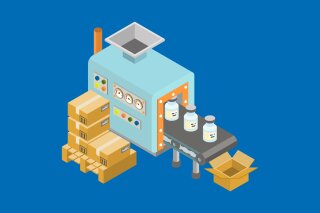What factors affect the security of supply of medicines in Finland?
Many medicines that are used in Finland are manufactured abroad and reach us via long and global production and supply chains.
- The first raw materials for a medicine may have been produced almost a year before a patient gets their medicine package from the pharmacy.
The chain is made up of several different stages, but one stage may not necessarily be carried out by more than a few alternative suppliers globally. A long supply chain that is concentrated on a few suppliers is always a risk. - However, Finland’s National Emergency Supply Agency and Finland’s self-sufficiency in medicines offer certainty regarding the availability of medicines.
What causes disruptions in the availability of medicines?
The manufacture of medicines involves multiple stages and it is regulated. The chain starts with the manufacture of the chemicals needed for the drug molecule and ends with the packaging materials and the logistics from the factory to the pharmacy, which is where patients get their medicines after being given guidance on their use. The raw materials for pharmaceuticals are only sourced from responsible suppliers that have been approved by the authorities and audited by pharmaceutical companies. This helps to ensure product quality but it also reduces the number of alternative suppliers. This makes the supply chain vulnerable.
Raw material suppliers produce materials in high volumes due to price pressures. A lack of alternative suppliers means there may not be enough raw materials for everyone, especially if there is an explosion in demand or something happens at the factory that prevents it from operating normally. In this type of situation, Finland is will be fighting for the same scarce raw materials as the USA and major European countries, for example. It is clear that the size of our purchasing volumes will not help us win this fight. This is particularly true for low-cost generic products with a reference price.
How can we ensure the functioning of pharmaceutical logistics and the availability of medicines?
Even during the pandemic, Finland hardly suffered from medicine shortages, as its security of supply stockpiles made up for the disruptions. Finland’s other strengths are its international and domestic cooperation, which also help to secure the availability of medicines. The Finnish pharmaceutical industry, authorities, hospital districts and pharmacies can be brought together quickly to discuss how to achieve common goals.
- In addition to cooperation, the predictability of the operating environment is important.
- Unexpected political decisions on issues such as reimbursement or pricing systems must be avoided so that Finnish pharmaceutical companies can make investments and support domestic employment.
- The prices of affordable generic reference price medicines should not be set too low, because as a small northern European country we cannot compete with volume when it comes to medicines, raw materials or services needed, which means we need to be an attractive and competitive market.
Does the statutory obligation to ensure the security of supply of medicines help to alleviate disruptions in availability?
In Finland, a statutory obligation safeguards the availability of medicines and pharmaceutical logistics. Security of supply stockpiles provide a buffer during disruptions in the security of supply, but if there is an explosion in demand or long delays in supply, these stockpiles will dwindle and the law does not identify all crisis-sensitive medicines or medical supplies. However, we already have the structures for preparedness and the security of supply organisation, which is a global rarity, is a real strength for Finland. Businesses also prepare for disruptions in supply.
This is how Orion prepares for disruptions in the supply of medicines:
- A specially defined list of patient-critical medicines is used to prepare for disruptions throughout the supply chain.
- This means that both Orion and the raw material suppliers in the supply chain must have the necessary stocks to manufacture the medicines despite disruptions and/or Orion has stocks of intermediate and/or final products.
Could Finland run out of medicines completely – how self-sufficient is Finland?
Finland has the capacity to produce almost all pharmaceutical forms. Tablets, capsules, injections, inhalers and medical creams can all be manufactured at Orion’s pharmaceutical plants. Active pharmaceutical ingredients are also manufactured in Finland, so we can go one step backwards in the supply chain. However, materials, raw materials and supplies from abroad are also needed in the production chain. This means we are unable to achieve complete self-sufficiency in pharmaceuticals.
Expert: Janne Maksimainen, Head Of Region Finland & Baltics
Also used as a source: Episode 5 of the Tabun murtajat podcast [in Finnish] Could we run out of medicines?









